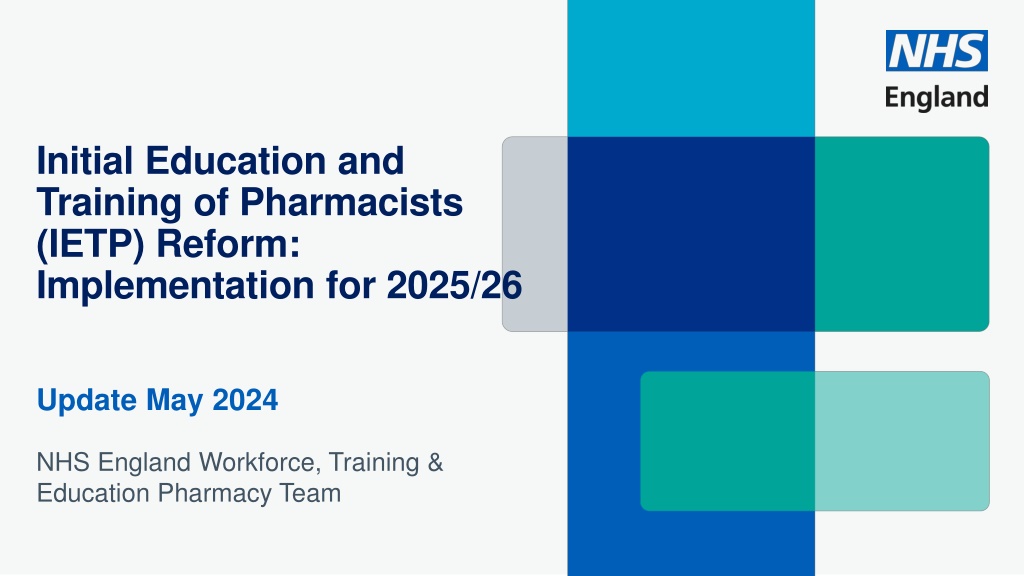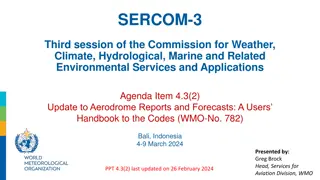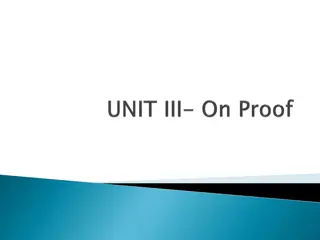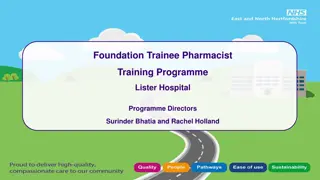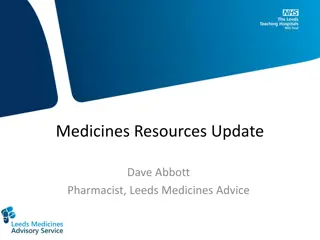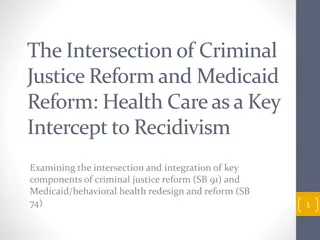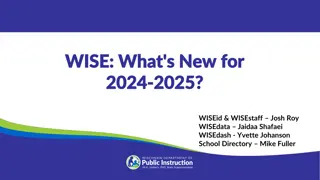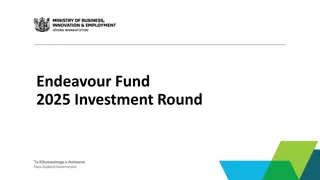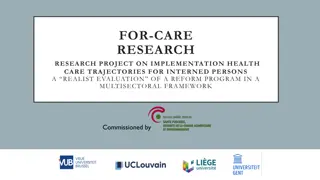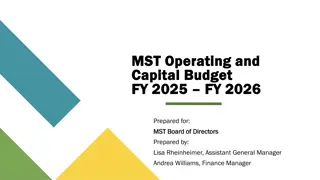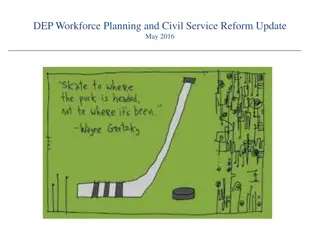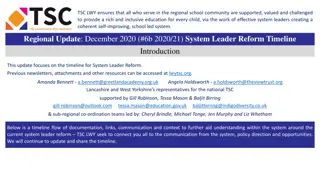Pharmacist Training Reform for 2025/26: Key Facts and Implementation Update
The reform in the Initial Education and Training of Pharmacists (IETP) for 2025/26 includes new standards, enhanced clinical capabilities, and independent prescribing requirements. The National Recruitment Scheme (NRS) is pivotal for quality management, with all trainee pharmacists recruited through this platform. Delegated responsibility for quality assurance now lies with NHSE Workforce Training and Education. The Foundation Training Year 2 introduces full new learning outcomes, including independent prescribing, affecting graduates from both traditional and overseas programs.
Download Presentation

Please find below an Image/Link to download the presentation.
The content on the website is provided AS IS for your information and personal use only. It may not be sold, licensed, or shared on other websites without obtaining consent from the author. Download presentation by click this link. If you encounter any issues during the download, it is possible that the publisher has removed the file from their server.
E N D
Presentation Transcript
Initial Education and Training of Pharmacists (IETP) Reform: Implementation for 2025/26 Update May 2024 NHS England Workforce, Training & Education Pharmacy Team
Content Introduction key facts relating to IETP reform Supervision and Assessment in the Foundation Training Year National Recruitment Scheme (NRS) for 2025/26 Planning training posts for 2025/26 Training and support in the Foundation Training Year 2
IETP reform: key facts 3
IETP reform key facts (1) New standards for Initial Education and Training of Pharmacists (IETP) published by the GPhC in 2021 New learning outcomes enhanced clinical capabilities and independent prescribing at point of first registration GPhC delegating responsibility for quality management of all training sites in England to NHSE Workforce Training and Education as the Statutory Education Body (SEB) for England. All trainee pharmacists must be recruited through the National Recruitment Scheme (NRS) on the Oriel platform for 2025/26 NRS is key element of quality management of training sites There will be no approval of training sites outside of this process (by NHSE or GPhC) No eligibility or mechanism for payment outside of this process Harmonisation of funding for training sites across all sectors for 2025/26: 26,500 Additionally, consistent training course offer for all trainees 4
IETP reform key facts (2) The 2025/26 Foundation Training Year is the first year where: (1) NHSE WT&E will take on delegated responsibility from the GPhC for the quality assurance/management of all foundation trainee pharmacists in England (2) The full new learning outcomes (incorporating independent prescribing) will be used All trainees graduating from university against the new learning outcomes will have to be assessed against all new learning outcomes including independent prescribing during the foundation year There will be some graduates entering foundation training in 2025/26 who will not have graduated against the new learning outcomes and will not be able to be an independent prescriber at first registration: Some MPharm graduates who have started against the old learning outcomes and have had their learning interrupted Graduates from OSPAP (Overseas Pharmacists' Assessment Programme) 5
https://www.pharmacyregulation.org/sites/default/files/document/standards-for-the-initial-https://www.pharmacyregulation.org/sites/default/files/document/standards-for-the-initial- education-and-training-of-pharmacists-january-2021_final-v1.3.pdf 6
Supervision and Assessment in 2025/26 7
Supervision and Assessment (1) The requirements for training sites from 2025/26 are set out within: 1. National Recruitment Scheme Terms of Participation and associated documents: a) Prescribing supervision and assessment in the Foundation Trainee Pharmacist Programme from 2025/26 b) Foundation training site requirements for 2025/26 c) Designated Supervisor Requirements for the 2025/26 Foundation Training Programme 2. NHS England Quality Framework 8
Supervision and Assessment (2) These requirements include: In accordance with GPhC requirements, Employers must ensure that the trainee will have access to: a Prescribing Learning Environment a Designated Supervisor a Designated Prescribing Practitioner Employers must use the NHS England Foundation Trainee Pharmacist Assessment Strategy Employers must use the NHS England Foundation Trainee Pharmacist E-portfolio All supervisors must comply with the requirements of the NHS England Workforce, Training and Education standards for supervisors 9
Supervision and Assessment (3) https://www.hee.nhs.uk/our-work/pharmacy/transforming-pharmacy-education-training/initial-education-training-pharmacists-reform-programme/implementing- foundation-pharmacist 10
Supervision and Assessment (4) Current NHS England Focus: Development / Iteration of the Assessment Strategy based on data from use in 2022/23 and 2023/24 training years and stakeholder working-groups Development of Prescribing Assessment Activities for incorporation in the Assessment Strategy Development of detailed guide for supervisors and trainees on how to use the Assessment Strategy Training Plan Template and associated guidance 11
Prescribing Assessment Activities Taking and documenting an appropriate medical, psychosocial and medication history including allergies and intolerances. This activity does not have to be completed in the nominated prescribing area as long as it does not progress to decision making and prescribing Performing and documenting appropriate physical and clinical examinations to decide the most appropriate course of action for the person. Follows local polices and has undertaken the appropriate training to undertake the role. This activity does not have to be completed in the nominated prescribing area as long as it does not progress to decision making and prescribing Undertaking prescribing consultations that incorporate: 1. Assessing the patient 2. Identifying evidence-based treatment options available for clinical decision making 3. Presenting options and reaching a shared decision 4. Enacting a prescribing decision (which can include modification or deprescribing) 5. Providing information and safety netting 6. Recording, monitoring and reviewing This activity must be completed within the nominated prescribing area. Prescription Writing Safely prescribing (or deprescribing) medicines for patients whilst considering: Application of relevant legislation and ethical decision-making related to prescribing Use of relevant systems and frameworks for medicines use Clinical governance Using tools and techniques to avoid medication errors associated with prescribing This activity must be completed within the nominated prescribing area. Log of 90 Hours Accurately documenting learning hours attributable to development as a prescriber in practice. This log of hours should include all of the hours spent completing the other Prescribing Assessment Activities above, and any other learning activities that are planned/agreed between the DPP and trainee. History Taking Physical and Clinical Examination Skills Prescribing Consultation 12
Nominated Prescribing Area Appropriate to the stage of training of a foundation trainee pharmacist An area that the DPP is sufficiently knowledgeable, skilled, and experienced to supervise within A clinical area relating to the provision of healthcare An area within which the trainee is able to access patients with whom they can conduct consultations Agreed by the DPP and Designated Supervisor Recorded in the E-portfolio when the trainee starts 13
Nominated Prescribing Area The nominated prescribing area does not need to be one in which the trainee pharmacist is actively diagnosing a new or undifferentiated condition it could for example be: the ongoing management of an existing condition (for example in a chronic condition clinic in general practice) medicines optimisation within the provision of clinical services (for example in the admissions setting in secondary care as part of medicines reconciliation) In conjunction with stakeholders from all sectors, NHS England have developed some examples of what newly qualified prescribing might look like in 2026, in our Emerging routes to early career prescribing in pharmacy resource Both of the examples above will require diagnostic and /or clinical reasoning to be demonstrated and would give plenty of opportunity for the capabilities of a prescriber to be demonstrated. 14
National Recruitment Scheme (NRS) Process for 2025/26 15
National Recruitment Scheme (NRS) process for 2025/26 (1) Date January 2024-March 2024 Activity Training sites entered into Oriel/NRS Notes Must agree to terms of participation agree that will provide access to DPP and prescribing learning environment Do NOT need to identify who the DPP is and where the prescribing environment is IF a multi-sector rotation is being including, must identify where this rotational site is Applicants apply to the NRS and create their preferences; a list of sites in which they wish to train Applicants undertake their recruitment assessment activity June 2024-October 2024 September 2024- October 2024 December 2024 Application and Preferencing Assessments Allocation Employers informed of trainees allocated to their training programmes and begin contacting them Jul/Aug 2025 Trainee starts 16
National Recruitment Scheme (NRS) process for 2025/26 (2) Next steps and key points for 2025/26: Removal of unsuccessful threshold for NRS assessments Focus on supporting students that performed less well in the NRS assessments, provision of feedback to university Training site may be allocated graduate against new learning outcomes or graduate against previous learning outcomes / OSPAP Will dictate need for prescribing environment/supervision NHS England will continue to work with pharmacy ICS leads, other key stakeholders and submitted training sites to support development towards training site requirements 17
Planning foundation training posts for 2025/26 18
Planning foundation training posts for 2025/26 Key focus: Develop supervision infrastructure - All training sites must have a Designated Supervisor (DS) and be able to provide access to a Designated Prescribing Practitioner (DPP) and a prescribing learning environment Identify whether a multi-sector rotation is included, and the site Support development of training plans, including consideration of prescribing learning and assessment 19
Training for DPPs and DSs DPPs and DSs must have appropriate experience and training to act effectively as educational supervisors This is a generic, transferable set of skills and knowledge There are a variety of training resources currently available to support people to gain these skills and knowledge Education Supervisor Training - ProPharmace NHSE WT&E will also provide clear training materials for DPPs and DSs on: How to use the foundation training year Assessment Strategy What the respective roles and responsibilities of the DPP and DS are 20
Training and Support in the Foundation Training Year 22
Training and Support in the Foundation Training Year (1) NHS England will provide three main components of support and training: (1) NHS England regional teams will provide a coordinated programme of support for trainee pharmacists and supervisors that aims to directly support quality of training sites, and use of and engagement with the assessment strategy and e-portfolio. This will include an induction event at the start of the training period, and check-point online events at key points. (2) NHS England will provide access for all trainee pharmacists to a funded foundation trainee pharmacist training offer that is specifically designed to support trainee pharmacists to develop against the learning outcomes. The full specification for this training course is currently in development, with the input of a range of stakeholders. (3) The Trainee Pharmacist Learning e-resources is a curated range of digital learning material for all trainee pharmacists to help to support learning and development throughout the Foundation Training Year. Resources have been grouped according to the Assessment Strategy and assessment activities and are intended to help trainee pharmacists to learn and develop, and to demonstrate competence against the learning outcomes. 23
Training and Support in the Foundation Training Year (2) NHS England will provide access for all trainee pharmacists to a funded foundation trainee pharmacist training offer Focussed work with a range of stakeholders is identifying priority areas within the new learning outcomes for inclusion, with reference to the 5-year continuum of learning within the new standards for IETP, and the indicative curricula that have been jointly developed with Pharmacy Schools Council The full specification is therefore still subject to further development, but provision will cover the following: Induction Day to orientate trainees to the programme Establishment of communities of practice for trainees, to provide additional support to develop their prescribing practice First Aid training As this national offer applies to trainees across all sectors of practice, it should be noted that it does not include training related to site-specific service provision. Therefore, it is expected that any training provision related to the specific needs of individual organisations or employers will continue to be provided by them, to ensure that trainee pharmacists offer safe and effective patient care. Further updates and details of the 2025/26 offer will be provided in due course. 24
Next steps 25
Next Steps NHSE WT&E Employers/ foundation training sites Continue to support training sites to develop plans Planning for training posts submitted within the NRS Rotations into other sectors Develop DS and DPP capacity and capability Training Plan development Accreditation by GPhC Publication of: Revised Assessment Strategy Training materials for DPPs and DSs Training Plan Template and Guidance Develop prescribing services and existing prescribers Confirmation of further details relating to training course provision 26
NHS England Regional Contacts For advice and information about planning foundation trainee pharmacist places Region Foundation Training Lead Stephen Doherty Contact email North West england.WTEpharmacy.nw@nhs.net North East Yorkshire and Humber Midlands Alison Sampson england.WTEpharmacy.ney@nhs.net Sejal Gohil england.foundationpharmacy.midlands@nhs.net england.WTEpharmacy.mids@nhs.net england.WTEpharmacy.eoe@nhs.net East of England South West Nkiruka Umaru Sarah Crawshaw sarah.crawshaw1@nhs.net england.WTEpharmacy.sw@nhs.net x.bray@nhs.net england.WTEpharmacy.se@nhs.net england.WTEpharmacy.london@nhs.net South East Xenia Bray London Rachel Stretch 27
Find out more and get in touch To receive news by email about the initial education and training of pharmacists, please complete this form: https://healtheducationyh.onlinesurveys.ac.uk/register-for-ietp- updates Engage with the Assessment Strategy and E-portfolio: www.hee.nhs.uk/our- work/pharmacy/trainee-pharmacist-foundation-year-programme Bookmark the NRS/Oriel site: www.lasepharmacy.hee.nhs.uk/national-recruitment/ Email address: england.traineepharmacist@nhs.net 28
